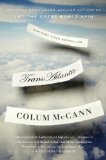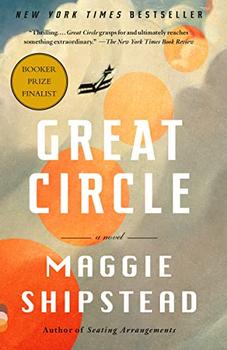Summary | Excerpt | Reading Guide | Reviews | Beyond the book | Read-Alikes | Genres & Themes | Author Bio

A Novel
by Colum McCannIt might be tempting to interpret Colum McCann's brilliant novel, TransAtlantic, as a literary exercise in pointillism. After all, he presents us with a series of "dots" which slowly click into place and paint, when we take a step back, one breathtaking picture. But McCann, the winner of the National Book Award for his previous book, Let the Great World Spin, goes one step beyond. The "dots" here are not fuzzy and loosely pixelated. Instead each literary vignette is so precisely painted that there's beauty both when the camera zooms in and out.
Three historical events, transatlantic crossings, create the scaffolding for the story: Frederick Douglass visits Ireland in 1845, at the start of the potato famine and is impressed by Irish emancipator Daniel O'Connell; in 1919, aviators Jack Alcock and Arthur Brown make history as they try to be the first people to fly nonstop across the Atlantic; and in 1998, Sen. George Mitchell departs for Ireland for one last attempt at peace talks, what would eventually come to be known as the Good Friday agreement.
Wrapped around these historical events are the stories of four generations of women: Lily Duggan, an Irish Catholic woman who is enslaved and shipped to America where she later settles as a free woman; her daughter, Lottie Ehlrich; Lottie's daughter, Emily and finally Emily's daughter, Hannah Carson. Each of these women will have "crossings" of their own (transatlantic or not) and move back and forth between Ireland and North America always redefining the concept of home.
TransAtlantic starts with the story of Jack Alcock and Arthur Brown attempting their first flight across the Atlantic, from Newfoundland. At this time, Lottie Ehlrich and her daughter, Emily, are a mother-daughter journalist-photographer team set up in the same hotel and intent on capturing every detail of the historic flight. Shortly before Brown leaves, Emily hands him a letter to mail once he lands in Ireland. It is addressed: "The Jennings Family, 9 Brown Street, Cork." That letter never quite reaches its intended destination but is instead passed on from daughter to daughter through the generations, unopened. "I admit that I have sat at the kitchen table, looking out over the lough, and have rubbed the edges on the envelope and held it in the palm of my hand to try to divine what the contents might be, but, just as we are knotted by wars, so mystery holds us together," says the last daughter, Hannah. This letter, a mysterious family heirloom that holds so much intrigue and value for successive generations, also serves to bind the story together.
It is not quite right to call the various chapters "stories" - instead they are snapshots from different years and different lives and, just as he did in Let the Great World Spin, McCann skillfully paints them all together on one sprawling canvas. In the hands of a less able writer, these interweavings, the connections between people and places, might seem forced, but they aren't so here.
An Irish native himself, McCann understands the bittersweet nostalgia that accompanies immigration. TransAtlantic captures the immigrant sense of displacement especially well. At one point in the novel, Lily's husband, Jon Ehlrich, brings her a beautiful painting of Ireland as a special present. The beauty represented in the painting takes Lily aback, she only knew poverty in her native country, "No part of Ireland had ever vaguely resembled the canvas Jon Ehlrich had brought home," McCann writes. She had been sent to work as a maid. "Hers had been a life of basements, of rat droppings, of inner staircases, of soup ladles. A half-day off a week. Sloshing through the wet dark streets. To buy tobacco. The only relief."
There are many novels out there - large tomes, more than 400 pages long - that bandy about the word "saga," which brings to mind long descriptions and flowery sentences. McCann proves you don't need either to create a sweeping story, but what you do need is vision. Always one for economy of writing, he goes a step further with TransAtlantic. He wields his pen like a scalpel trimming every extra word, every extra incident out. Some might even call the first chapter choppy but I found it to be an accurate reflection of the flight ahead for the two aviators. "What was a life anyway? An accumulation of small shelves of incident. Stacked at odd angles to each other," McCann writes. He is a master at knowing just which "small shelves of incident" to shine a spotlight on and with his marvelous, measured writing he allows the reader to make wondrous discoveries as we piece the connections together.
McCann has had me hooked me on his writing since his novel Dancer. He has proven time and again that he is a powerhouse among contemporary fiction writers. He understands that what binds humanity together are not broad, panoramic moments but the smaller-scale happenings that bring those large historical events home to the everyday person. "The tunnels of our lives connect, coming to daylight at the oddest moments, and then plunge us into the dark again," McCann writes, "We return to the lives of those who have gone before us, a perplexing mobius strip until we come home, eventually, to ourselves." By mining these intersections with infinite grace and precision, McCann has created a stunning masterpiece. TransAtlantic is an absolute tour-de-force. If you can read only one book this year, this should be it.
![]() This review was originally published in The BookBrowse Review in June 2013, and has been updated for the
May 2014 edition.
Click here to go to this issue.
This review was originally published in The BookBrowse Review in June 2013, and has been updated for the
May 2014 edition.
Click here to go to this issue.

If you liked TransAtlantic, try these:

A Short Walk Through a Wide World
by Douglas Westerbeke
Published 2025
The Invisible Life of Addie LaRue meets Life of Pi in this dazzlingly epic debut that charts the incredible, adventurous life of one woman as she journeys the globe trying to outrun a mysterious curse that will destroy her if she stops moving.

by Maggie Shipstead
Published 2022
An unforgettable story of a daredevil female aviator determined to chart her own course in life, at any cost - Great Circle spans Prohibition-era Montana, the Pacific Northwest, Alaska, New Zealand, wartime London, and modern-day Los Angeles.
Your guide toexceptional books
BookBrowse seeks out and recommends the best in contemporary fiction and nonfiction—books that not only engage and entertain but also deepen our understanding of ourselves and the world around us.